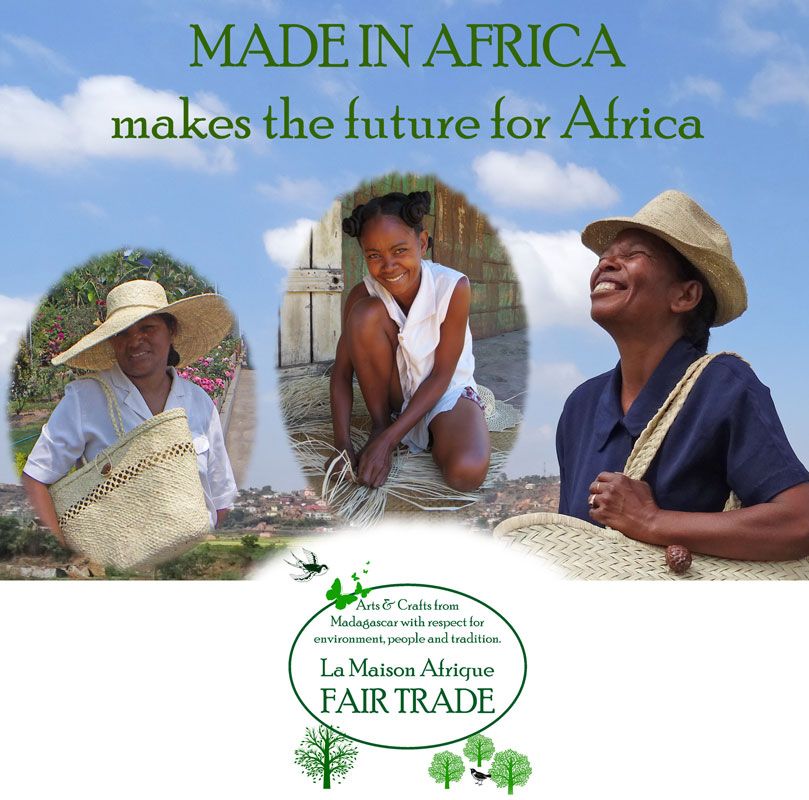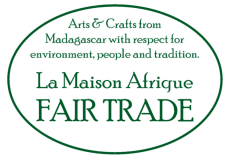MADE IN AFRICA makes the future for Africa
Situational analysis January 2024

MADE IN AFRICA - makes the future for Africa
Africa is rich in raw materials - but when the manufacturing does not take place in Africa, Africa does not become rich. The export of raw materials causes Africa to miss out on added value, remaining dependent on imports of consumer goods and capital goods. In addition, Africa is losing technological development and jobs for a population that, according to the UN, is the most rapidly growing in the world.
La Maison Afrique FAIR TRADE focuses on goods with high added value, does not trade in raw materials. The colonial trade pattern was based on Africa being a supplier of raw materials. We work for change.
Made in Africa – makes the future for Africa.
The benefit, necessity and potential of local processing of Africa's raw materials is emphasized by more and more actors and with increasing emphasis. Below are five examples of significant actors: African Union (AU), World Bank, International Trade Center (ITC), United Nations Conference on Trade and Development (UNCTAD), Africa Import-Export Bank (AFREXIMBANK).
African Union (AU) The creation of the African Continental Free Trade Area (AfCFTA) is one of the African Union's "flagship projects" to transform the continent into a global powerhouse. AfCTA includes 54 African countries* and is thus the world's largest free trade union. The AfCFTA shall in particular promote trade in value-added products in Africa as well as services. By reducing trade barriers between African countries, the AfCFTA facilitates the establishment of regional supply chains/value chains. This favours investment and job creation in Africa.
Trade within the AfCTFA began on January 1, 2021. The African Union's theme for the year 2023 was; "Acceleration of AfCFTA Implementation"
The World Bank "Africa's Pulse" is an analysis of what is shaping Africa's economic future. The World Bank Group publishes a report twice a year. The latest (autumn 2023) focuses on the need for local processing of Africa's raw materials for increased economic welfare in Africa. In particular, it is stated that processing provides more and better jobs for Africa's rapidly growing population.
In addition, increased local processing would mean larger and more secure government revenues because of; more tax payers, a more diversified economy, more stable export income as the volatile world market prices of raw materials are replaced by manufactured goods. Larger and more secure incomes are something African countries are in dire need of to cover investment needs in infrastructure, health and education.
The World Bank states that the last decade has meant an economic growth in Africa that has been completely insufficient to combat extreme poverty, increase welfare, create jobs - and deal with an escalating climate crisis.
International Trade Center (ITC)** in collaboration with the African Union and the EU.
The report "Made by Africa - creating value through integration" shows the great benefit and potential that exists in locally increasing the added value of African raw materials before export. The report highlights trade under the African Continental Free Trade Agreement (AfCFTA) as an important opportunity to create regional value chains between companies in African countries. Currently, Africa has a very small (2.3%) share of global exports and it is dominated by raw materials.
The report, which is based on more than 10,000 interviews with African companies, examines the potential of value chains in Africa for pharmaceuticals, baby food, cotton clothing and automobiles. The four sectors were chosen out of 94 promising value chains. The four sectors reflect African goals to improve food security, health and technical skills.
While the report shows great potential for regional value chains in Africa, it also highlights challenges such as:
- Infrastructure (roads, railways etc) for trade between African countries is poor.
- Financing is difficult to access and expensive for African companies.
- High costs and uncertain access to electricity.
- Lack of support for businesses that recycle waste etc engage in environmental care.
The report "Made by Africa – creating value through integration" was published November 2022.
United Nations Conference on Trade and Development (UNCTAD) By exploiting their enormous resources of materials needed by high-tech sectors and their own growing consumer markets, African economies can become of great importance in future global value chains. - This is what UNCTAD writes in its report on economic development in Africa 2023.
The argument put forward is that Africa's large resources of critical minerals and metals (e.g. aluminium, cobalt, copper, lithium, manganese) position the continent as an attractive destination for the manufacture of e.g. cars, mobile phones, solar panels. The report highlights that an environment that favours high-tech industries would help raise wages on the continent.
Production chains in Africa are also an opportunity for the climate globally: The continent's large renewable energy potential, especially in solar energy, can help reduce dependence on fossil fuel-based energy sources. - But currently only about 2% of global investment in renewable energy goes to Africa.
UNCTAD also emphasizes that diversifying African economies would increase their resilience to future shocks.
However, the report notes that Africa needs significant investment in infrastructure to strengthen its position as a destination for supply chains. Domestic industry and local companies also need better opportunities to design, procure, manufacture and deliver.
UNCTAD underlines the need for debt relief in order for African countries to have the financial space to invest in their supply chains. This is particularly necessary as African countries pay on average four times more to borrow than the US and eight times more than European economies.
UNCTAD's report "Economic Development in Africa Report 2023" was published in August 2023.
Africa Import-Export Bank ***(AFREXIMBANK). AFREXIMBANK's African Trade Report 2023 is entitled: "Export Manufacturing and Regional Value Chains in Africa under a New World Order". The report was published in June 2023.
Citing from the report; “The continued marginalisation of Africa, reflected in the steadily declining share of its contribution to global trade, is largely the consequence of the colonial development model of resource extraction. Despite ongoing efforts to boost industrial production, Africa’s growth continues to be highly correlated with the dynamics of commodity prices, in a world where global trade and growth have been largely driven by manufactured goods with increasing technological content. “ (…)
“To raise its share of global growth and global economy, the continent must accelerate the diversification of its trade and foster its integration into the sources of growth and export by implementing proactive policies and investment that put countries on an irreversible path of increasing value addition and expanding manufacturing output.” (…)
"The continued marginalization of Africa, reflected in its steadily declining share of global trade, is largely the consequence of the colonial development model of resource extraction. Despite ongoing efforts to increase industrial output, Africa's growth continues to be highly correlated with the dynamics of commodity prices, in a world where global trade and growth have largely been driven by manufactured goods with increasing technological content." (...)
"To increase its share of global growth and trade and promote its integration into the global economy, the continent must accelerate the diversification of its sources of growth and exports by implementing proactive policies and investments that position countries that lead to value addition and expanded manufacturing output." (…)
“The report shows that the benefits of a successful manufacturing-led growth model in Africa will be wide ranging, boosting both intra- and extra-African trade and mitigating the region’s exposure to adverse commodity terms of trade shocks, which have been largely responsible for Africa’s structural trade deficits and marginalisation in the global economic and trading arena.”
*As of August 2023, 54 (of the African Union's 55 member) nations had signed, of which 47 submitted applications for AfCFTA ratification.
**) The ITC is a joint body of the UN and the WTO, dedicated to helping small businesses in developing countries to trade. Originally created by the General Agreement on Tariffs and Trade (GATT) in 1964, the ITC has operated since 1968 under the joint auspices of the GATT/WTO and the United Nations.
***) The African Export–Import Bank is a pan-African supranational multilateral financial institution created in 1993 under the auspices of the African Development Bank (AfDB). AFRIMEX has 50 African member countries, headquarters in Cairo and 5 regional offices.
In summary: MADE IN AFRICA makes the future for Africa
La Maison Afrique FAIR TRADE is since start 1995 a non-profit Fair Trade organization that supports and cooperates with artisans in Madagascar. Raison d’être (mission) is summerized in the logo: "Arts & Crafts from Madagascar with respect for environment, people and tradition. FAIR TRADE".
La Maison Afrique FAIR TRADE focuses on goods with high added value, does not trade in raw materials. A high added value is achieved by processing the country's own natural materials (or recycling locally collected waste) into finished consumer goods. La Maison Afrique FAIR TRADE range mainly consists of hats and bags skilfully handcrafted from artisans' locally grown natural fibres; sisal, raffia palm leaves, mountain grass or sedges. The manufacturing process is highly manual and requires a great amount of craftsmanship. The manufacturing ensures important crafts kills survives and develops - and that many good job opportunities are created. The production is also climate and environmentally friendly; e.g the natural fibres used are harvested by hand and sun-dried, the fibres are continuously harvested from perennial plants. Dyes used meet requirements for health and the environment.
Before production, the artisans receive interest-free loans from La Maison Afrique FAIR TRADE. The loan covers the entire value of the goods and the entire manufacturing period. The artisans also receive support in the form of export administration, market information and orders within the framework of a long-term collaboration.
All products in La Maison Afrique FAIR TRADE range are genuine handicrafts made from the country's own natural materials (or locally collected waste).
All products in La Maison Afrique FAIR TRADE range are also certified by the Ministère de l'Artisanat et des Metiers as « Produits Artisanaux fait main », i.e. handmade craft products.
Top photo: Designers and artisans of hats and bags in the La Maison Afrique FAIR TRADE range. From right: Madame Raton with hat and shoulder bag, Madame Rose braiding hats from sundried, natural white raffia palm leaves, Madame Olga with hat and basket bag.

La Maison Afrique FAIR TRADE
-
+46 (0) 706017777
-
This email address is being protected from spambots. You need JavaScript enabled to view it. -
Trustorps Gård
311 65 Vessigebro
SVERIGE -
VAT/Orgnr: SE556526323201

